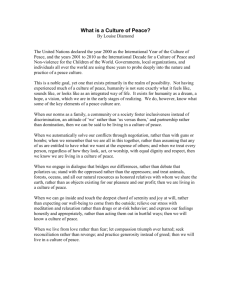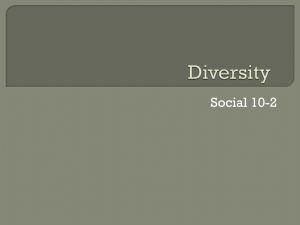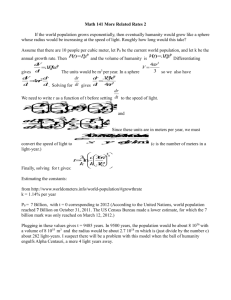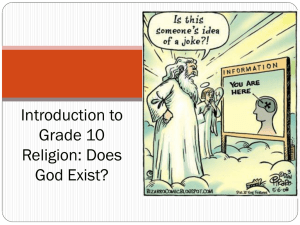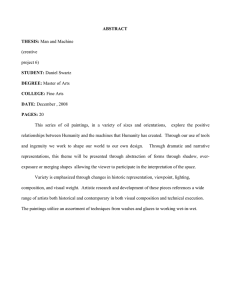Graduation Ceremony 1 Graduand’s Address Monday 18 November 2013 at 1630hrs
advertisement
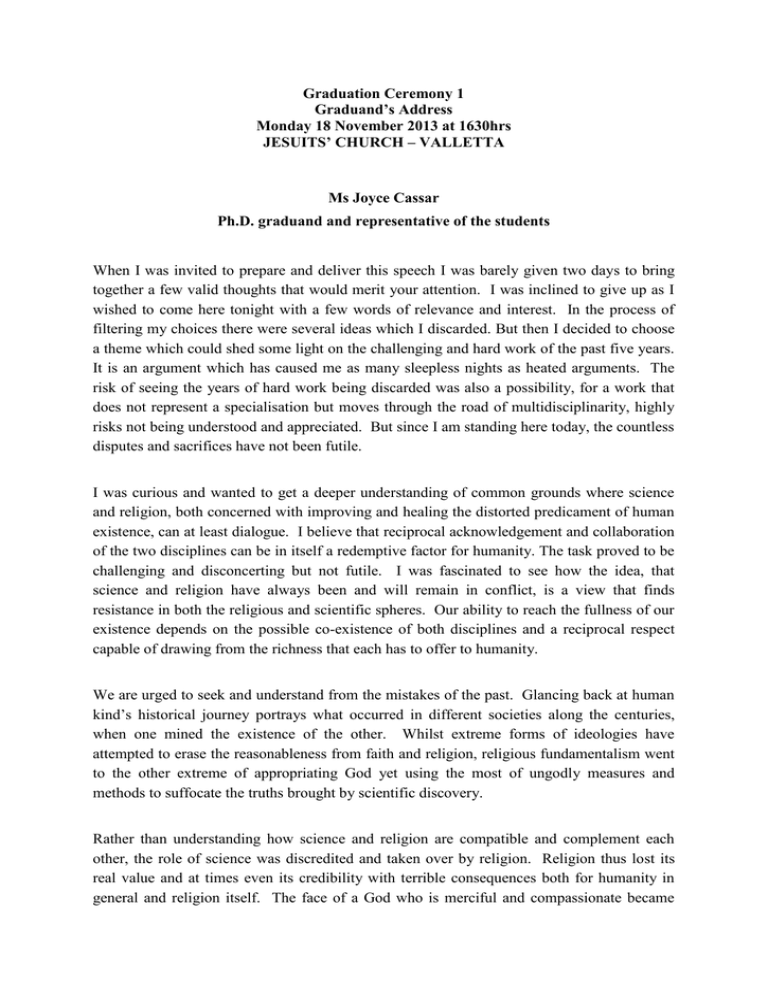
Graduation Ceremony 1 Graduand’s Address Monday 18 November 2013 at 1630hrs JESUITS’ CHURCH – VALLETTA Ms Joyce Cassar Ph.D. graduand and representative of the students When I was invited to prepare and deliver this speech I was barely given two days to bring together a few valid thoughts that would merit your attention. I was inclined to give up as I wished to come here tonight with a few words of relevance and interest. In the process of filtering my choices there were several ideas which I discarded. But then I decided to choose a theme which could shed some light on the challenging and hard work of the past five years. It is an argument which has caused me as many sleepless nights as heated arguments. The risk of seeing the years of hard work being discarded was also a possibility, for a work that does not represent a specialisation but moves through the road of multidisciplinarity, highly risks not being understood and appreciated. But since I am standing here today, the countless disputes and sacrifices have not been futile. I was curious and wanted to get a deeper understanding of common grounds where science and religion, both concerned with improving and healing the distorted predicament of human existence, can at least dialogue. I believe that reciprocal acknowledgement and collaboration of the two disciplines can be in itself a redemptive factor for humanity. The task proved to be challenging and disconcerting but not futile. I was fascinated to see how the idea, that science and religion have always been and will remain in conflict, is a view that finds resistance in both the religious and scientific spheres. Our ability to reach the fullness of our existence depends on the possible co-existence of both disciplines and a reciprocal respect capable of drawing from the richness that each has to offer to humanity. We are urged to seek and understand from the mistakes of the past. Glancing back at human kind’s historical journey portrays what occurred in different societies along the centuries, when one mined the existence of the other. Whilst extreme forms of ideologies have attempted to erase the reasonableness from faith and religion, religious fundamentalism went to the other extreme of appropriating God yet using the most of ungodly measures and methods to suffocate the truths brought by scientific discovery. Rather than understanding how science and religion are compatible and complement each other, the role of science was discredited and taken over by religion. Religion thus lost its real value and at times even its credibility with terrible consequences both for humanity in general and religion itself. The face of a God who is merciful and compassionate became distorted, and his love and closeness to humankind became permanently tarnished, if not at times erased. On the other hand, attempts to erase religion by extreme ideologies can be witnessed even in the present day and age with anti-religious oppression and violence in some countries, not to mention the return of an aggressive atheism with Dawkins, Hitchens and Harris. Yet again, we are witnessing the development of another form of extremism. From erroneously attempting to unite science and religion, by applying to one the logic of the other, religion is being set aside and is considered either to be irrelevant or has become an individualistic form of practice. The signs of our times already are indicating that this does not augur well. Religion has always been the practice of communities, that of bringing people together and not separating them. It is a fact that both science and religion pursue knowledge of human kind, the earth, the universe and beyond. There is no doubt that each does so using different approaches: science favouring reason, empiricism and evidence, while religion moves in the context of the history of humanity through revelation, faith and the sacred. Yet, the thesis that they are incompatible can be opposed for a number of reasons for we can all witness the ample evidence that shows how Christianity and some other religions have integrated well with certain scientific ideas throughout the centuries. Alvin Plantinga argues that there is only superficial conflict but deep agreement between science and religion. Albert Einstein and after him J.B. Feibleman agreed that science without religion can be lame and destructive and that religion without science can become blind and mere superstition. But what I find very insightful is the view of Max Planck who said, “Science cannot solve the ultimate mystery of nature. Humanity that is a part of nature is therefore part of the mystery that it is trying to solve.” I visualise science and religion as they move along separate paths that by necessity need to be like railway tracks. Railway tracks move along parallel lines, yet we do not see them as incompatible for we understand the value and equal importance each holds. They serve the train to arrive to its destination, both moving alongside the other, crossing and curving along the path as necessary. The lines never overcome each other or decrease the distance that separates them. Yet, they nonetheless never increase that distance which is what makes them function in harmony so the train can travel safely on them. I am sure that there is no scientific progress that can melt away authentic and true faith and religion. Neither, can faith or religion, unless they reduce themselves into some form of superstition, erase the immense and pervading knowledge and progress brought about by science. Like the left and right areas of the human brain they are not only compatible but need each other to create activity. The left brain activity has been associated to an ability to take things apart, to dissect them, analyse how they fuse and work together. The right brain activity has been linked with putting things together. Isn’t this in a way a reflection of how of science and religion respectively function? One gives explanation, whilst the other brings about meaning. This is how I see the representation of an ideal movement between science and religion as they progress towards a one goal - that of discovering who we are, and as we grow into this knowledge we become more perfected, more of a people rather than isolated individuals seeking solely the interest of the “me” rather than that of the “we.” I am certain that our essence as human beings cannot thrive for long in a world which is only interested in things and achievements based on self centred scopes. Our spiritual, metaphysical dimension thirsts for interactive relationships; with the earth we live in, with each other but ultimately with where and from Whom we originate. We are children with a DNA that pervasively draws us towards the Creator. If an integral part of who we are is ignored and discarded we are destined to face despair and destruction. If humans are seen as things which function to reach goals and achieve power, then the cost could be that of losing the deeply profound essence of who we are. There is no doubt that all efforts made by any socio-economic or political institution, in attempting to bring unity between communities and countries, are inclined to failure if science or religion wipe out their respective validity. I found sufficient literature and research that is more inclined towards a phenomenological view of the world and the person, where knowledge is not an end in itself separated from wisdom. The authors suggested that humanity needs both science and religion in its quest to continue in its existence on this earth. Nevertheless, humanity appears more and more determined to move in a direction where we are becoming caged in an existence which, despite being without bars, is in any case a prison of the “I”. Personally I cannot imagine a world where the “I” does not reach out to others but simply exists to focus on itself. Healthy human beings cannot thrive living for themselves. We are made for others, we have an innate necessity to be concerned and to care for others. Even science gives a diagnosis of individuals who lack the empathy and ability to care for others as suffering from one type or other of Personality Disorders with the worse cases being labelled as psychopaths. Science considers unhealthy certain levels of desensitisation towards others. I dare say that we have started losing the need to connect with others as we are too absorbed with ourselves. We have started moving along a path which will surely lead us away from hope towards despair. We do not understand that in our inability to save us from ourselves, we need both reason and faith. Losing who we are, losing religion as in a relationship with the Creator brings with it greater losses. With what will we be able to replace the centuries old wisdom which has been revealed to humanity in time through faith and religious tradition? In losing our wisdom we are not realising that we will eventually bring along our own termination. Here I agree with Jonathan Sacks who writes that “when a society loses its religion it tends not to last very long thereafter.” For when a society loses its soul, it is about to lose its future. The solution to the foreseeable predicament is not for the elimination of boundaries that give identity to both science and religion. The role of both is to provide a terrain which continues to challenge the development and the search of the other. They respectively become a telescope and a light as they each challenge each other along the path of progress out of the darkness. I see the role of science and religion depicted best by the two wings described by John Paul II in his Encyclical Fides et Ratio. Science as in Reason and Religion as Faith, are represented by the two wings on which the human spirit rises to the contemplation of truth. Humanity deprived of any one of its wings will forever be deprived of flying and will never be able to find its true height and fullness of the meaning of who it is and who it was meant to become. So with these words I come to a conclusion. I would like at this point to thank this University and its administration, I thank my tutor and co-tutors for their patience, as each respectively represented religion and science during the course of my work. Allow me to congratulate you, graduand colleagues on the conclusion of the years of hard work that may have brought about frustration, determination as well as joy and I wish you all the best that the future can bring. May you always be able to fly to the heights of the eagle using the two important wings of life, not only in your career but even more importantly, in your life.
